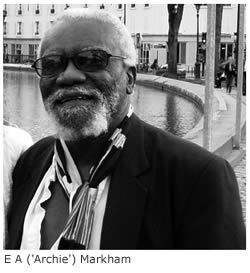Two Things at Once
E A Markham (1939–2008)

We were saddened to hear shortly before going to press of the death of E A (‘Archie’) Markham who was to have written a feature for this issue about the poet’s life in Paris. Archie had settled there in 2005, after retiring as Professor of Creative Writing at Sheffield Hallam University, and was an active participant in the city’s anglophone literary life as well as a mordantly witty observer of wider French cultural and political life. He had always been a wanderer, as unconcerned by national borders as he was by boundaries of genre in literature. He had come to London from Montserrat as a teenager in the 1950s, initially working in a garment factory before returning to education, taking a degree at Lampeter and doing research in seventeenth century drama at the Universities of East Anglia and London. In the 1970s, he was involved in experimental drama in the Caribbean and co-operative house-building in the South of France, lived for periods in Germany and Sweden, was professionally snubbed by Philip Larkin in Hull and visited Enver Hoxha’s Albania. In subsequent decades he was media co-ordinator for a development project in Papua New Guinea, a writer-in-residence at the University of Ulster, an advocate for Montserrat in the years of its hurricane and volcano, editor of the multi-cultural arts magazine Artrage, and a visitor to Mozambique.
Although he had started as a dramatist, Archie began to make his name as a poet in the crowded world of British small press publication in the 1970s, both under his own name and through the heteronymic identities of Paul St Vincent and Sally Goodman. The latter two personae allowed him to address issues of race and gender in a more focused way, but were perhaps also a way of coping with his own prolific talent, as he would often publish poems in the same issue of a magazine under more than one identity. In the 1980s his work started to achieve mainstream recognition with collections such as Love Politics and Food, Human Rites and Living in Disguise. As interest developed in post-colonial literature he was asked to edit the influential anthologies Hinterland: Caribbean Poetry from the West Indies and Britain (1989) and The Penguin Book of Caribbean Short Stories (1996). He was a gifted and dedicated teacher who had worked in Further Education and as a writer-in-residence across Britain and Ireland before becoming a lecturer and then Professor of Creative Writing at Sheffield Hallam University. He was also a trustee and active supporter of The Poetry School, founded by his great friend and former partner, the poet Mimi Khalvati. As well as continuing to publish poetry (his 2002 collection A Rough Climate was shortlisted for the T S Eliot prize), he developed a growing reputation as a writer of highly digressive, genre-defying fiction from the campus novel Marking Time (1999) to the reflections on exile and age of At Home With Miss Vanesa (2005). At the time of his death, he was working on a Collected Poems and a new volume of stories, while a memoir of his early life in London, Against the Grain was about to be published.
A recent poem, ‘Hand and Eye’ catches some of Markham’s sensibility and spirit as well as demonstrating his craft. The speaker has, for the second time burned a cooking pot:
So, time to sit back and ponder why it’s gone wrong.
You never were a ball-player, a Sobers, a Beckham.
Even juggling with Latin embarrassed you with its spillage
Of meaning. So why persist in thinking, after life’s experience,
You could better what the Americans said of one of their Presidents
And try to chew gum and scratch your arse at the same time.To cook the meal and write the poem is the issue:
When will you give up this fantasy? You recall the young
Shirley Temple at the piano announcing to the audience
That she would play and sing at the same time.
And you think, all these years after Temple; all these men
In the world maintaining two families at the same time;
The politicians conducting war and peace at the same time;
Is it too much to ask yourself to do these two things at once?
The choice, as for Yeats, is between ‘perfection of the life, or of the work’. Yet who but Archie would ask the question with such characteristic verve and modesty? He was always doing at least two things at once. He will be missed.
Page(s) 46
magazine list
- Features

- zines

- 10th Muse
- 14
- Acumen
- Agenda
- Ambit
- Angel Exhaust
- ARTEMISpoetry

- Atlas
- Blithe Spirit
- Borderlines
- Brando's hat
- Brittle Star

- Candelabrum
- Cannon's Mouth, The
- Chroma
- Coffee House, The
- Dream Catcher
- Equinox
- Erbacce
- Fabric
- Fire
- Floating Bear, The
- French Literary Review, The
- Frogmore Papers, The
- Global Tapestry
- Grosseteste Review
- Homeless Diamonds
- Interpreter's House, The
- Iota
- Journal, The
- Lamport Court
- London Magazine, The
- Magma
- Matchbox
- Matter
- Modern Poetry in Translation
- Monkey Kettle
- Moodswing
- Neon Highway
- New Welsh Review
- North, The
- Oasis
- Obsessed with pipework
- Orbis
- Oxford Poetry
- Painted, spoken

- Paper, The
- Pen Pusher Magazine

- Poetry Cornwall
- Poetry London
- Poetry London (1951)
- Poetry Nation
- Poetry Review, The
- Poetry Salzburg Review
- Poetry Scotland
- Poetry Wales
- Private Tutor
- Purple Patch
- Quarto
- Rain Dog
- Reach Poetry
- Review, The
- Rialto, The
- Second Aeon
- Seventh Quarry, The
- Shearsman
- Smiths Knoll
- Smoke
- South
- Staple
- Strange Faeces
- Tabla Book of New Verse, The
- Thumbscrew
- Tolling Elves
- Ugly Tree, The
- Weyfarers
- Wolf, The

- Yellow Crane, The
